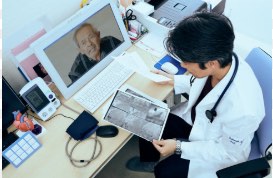Artificial Intelligence
Now entering its second academic year, this pioneering dual degree program is designed to equip future physicians with the AI expertise needed to revolutionize patient care.
Dr. Ronald Rodriguez, program director of the nation's first MD/MS in AI dual degree at The University of Texas Health Science Center at San Antonio, is at the forefront of AI's transformation of healthcare. He offers a look at this groundbreaking education.
Dr. Khulood Alsayegh, Dubai Health Authority's head of clinical standards and guidelines and the only healthcare AI ethics lead assessor in the Middle East and Africa, teaches courses to help build a regional community of assessors.
AI & ML Intelligence
The kidney care provider's build-not-buy effort has shown great results: 30-day readmissions are down 36%, hospitalizations among high-risk patients are down 49% and optimal starts are up 67%.
"On average, only half of patients with chronic disease adhere to their care plans and medications as instructed," says one doctor. "Patients expect on-demand support, and that is not how most health systems operate today."
While artificial intelligence (AI) has long been in use in healthcare, the industry is scrambling to deploy the newer and more innovative AI technologies such as generative AI. Data quality, security, and cost, however, are top challenges that are making healthcare organizations pause.
Attendees and panelists discuss what they've learned from the health systems and innovators piloting and implementing leading-edge healthcare technologies at the recent forum.
Health systems need to engage patients, families and clinicians as partners when leveraging AI and other advanced technologies to achieve the best possible care outcomes, says HIMSS Chief Scientific Research Officer Anne Snowdon.
The hospital's central goal of improving patient engagement and care quality has helped it achieve Stage 7 on the AMAM maturity model and more. Jong-Soo Choi, CTO of the Korea health system and a HIMSS25 Changemaker, explains.
Dr. Colin Banas, chief medical officer at DrFirst, says mental health providers quickly adopted telehealth during the pandemic. Now he says he thinks AI agents can help understaffed offices with triage and prescription management.









